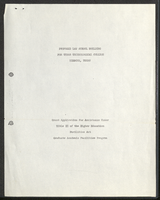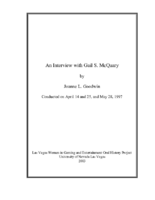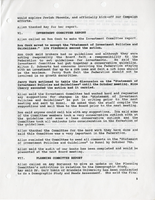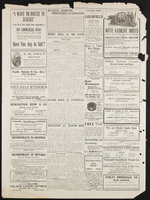Search the Special Collections and Archives Portal
Search Results

Charles Scott Emerson oral history interview: transcript
Date
Archival Collection
Description
Oral history interview with Charles Scott Emerson conducted by Claytee D. White on December 21, 2017 for the Remembering 1 October Oral History Project. In this interview, Charles Scott Emerson discusses his work with the American Red Cross and the disaster relief the organization provided during the aftermath of the October 2017 mass shooting in Las Vegas, Nevada. The interview begins with a discussion on Emerson's early life and career in Missouri and how he moved to Las Vegas in 2004. Emerson talks about the American Red Cross response plans and coordinated operations that are in place for when the community is faced with a disaster, going into specific detail on the community-wide response to the October 1, 2017 shooting. He gives a behind-the-scenes glimpse into how relief work is organized, using this interview as a chance to praise the hidden heroes of the October 2017 tragedy, including the people at the Family Assistance Center, the Attorney General's Office, the Driver's License Bureau, and the Coroner's Office, as well as mental health providers, child care workers, blood donors, and more. Throughout the interview, Emerson puts special emphasis on the importance of community in order to offer support in the aftermath of a tragedy as well as to prevent a man-made tragedy from occurring again.
Text
Clayton Anderson (Elko County School District) oral history interview conducted by Magdalena Martinez and Elia Del Carmen Solano-Patricio: transcript
Date
Archival Collection
Description
From the Lincy Institute "Perspectives from the COVID-19 Pandemic" Oral History Project (MS-01178) -- Education sector interviews file.
Text
Vera Moore (True Beginnings/Divinity House) oral history interview conducted by Kelliann Beavers and Elia Del Carmen Solano-Patricio: transcript
Date
Archival Collection
Description
From the Lincy Institute "Perspectives from the COVID-19 Pandemic" Oral History Project (MS-01178) -- Community organization interviews file.
Text

Law schools and law libraries: grant application, bibliography, article, and memos
Date
Archival Collection
Description
Folder contains a grant application for a proposed law school building for Texas Technological College, 1966; a bibliography of resources related to law schools; a scholarly article titled "Libraries, Liberties, and the First Amendment" by Robert M. O'Neil, 1973; and memos related to the development of a law library at UNLV. From the University of Nevada, Las Vegas William S. Boyd School of Law Records (UA-00048).
Text

Christian Chan oral history interview: transcript
Date
Archival Collection
Description
Oral history interview with Christian Chan conducted by Cecilia Winchell, Jerwin Tiu, and Stefani Evans on May 06, 2022 for the Reflections: the Las Vegas Asian American and Pacific Islander Oral History Project. In this interview, Chan begins by describing her childhood in Hong Kong and later moving to San Francisco, California with her family, then to Las Vegas, Nevada in 1965. She recalls attending Sunrise Acres and Roy Martin Middle School before graduating from Valley High School as valedictorian. In college, Chan attended the University of Nevada, Las Vegas (UNLV) and graduated with a degree in engineering. After college, she found work in the Las Vegas Valley Water District and became the first woman engineer. During her five years there, she excountered subtle sexism for the first time. Chan continues the interview by describing her work while she lived in California, as well as her years internationally living in the Philippines as well as Ecuador. Throughout the interview, Chan touches on topics ranging from identity, to her impressions of the different generations, discrimination, and the growth of Las Vegas.
Text

Sanje Sedera oral history interview: transcript
Date
Archival Collection
Description
Oral history interview with Sanje Sedera conducted by Kristel Peralta, Cecilia Winchell, Ayrton Yamaguchi, and Stefani Evans on April 16, 2021 for Reflections: The Las Vegas Asian American and Pacific Islander Oral History Project. Sanje Sedera discusses growing up in Sri Lanka, formerly Ceylon, with his family. He shares his educational history, moving from Sri Lanka to Darwin, Northern Territory, Australia as a high schooler to learn English before immigrating to the United States to attend Idaho State University. Sedera discusses the political unrest and civil war that took place in Sri Lanka between the Tamil and Sinhalese people, and how he grew to appreciate political activism instilled in him by his paternal grandparents. Sedera shares his employment history working as a manager for K-Mart, an opportunity that brought him to Las Vegas, as well as his entrepreneurial pursuits of owning a mortgage business and becoming a realtor. He talks about the financial crisis of 2008 that led to losing his business, his attempts to run for public office, and how he helped to form Nevada's Asian American Democratic Caucus. Sedera concludes with a discussion of his Buddhist practice and how these philosophies have shaped his life.
Text

Transcript of interview with Catherine Hunt by Dennis Hunt, March 2, 1980
Date
Archival Collection
Description
On March 2, 1980, Dennis Hunt interviewed his mother, Catherine Hunt (born August 25, 1932 in Palmyra, Missouri) about her life in Southern Nevada. The two discuss Catherine Hunt’s work as a secretary before becoming a housewife. The interview concludes with Catherine Hunt’s thoughts on population growth, women’s rights, and the Equal Rights Amendment.
Text

Transcript of interview with Gail S. McQuary by Joanne L. Goodwin, April 14, 1997, May 25, 1997, & May 28, 1997
Date
Archival Collection
Description
Interviewed by Joanne L. Goodwin. Gail Spaulding (Jaros) was born on October 16, 1937, in Cicero, Illinois. a suburb of Chicago. Both of her parents were in show business. Gail began tap and ballet lessons when she was five years old. She signed as a dancer with Moro-Landis Productions in 1956, and she worked for that company at the Sahara Hotel and Casino in Las Vegas, the Riverside Hotel and Casino in Reno, and the Beverly Hills Country Club in Covington, Kentucky. Gail was promoted to line captain and did choreography at the Beverly Hills Country Club. She stopped dancing shortly before her daughter was born and worked as a cocktail waitress at the Riverside Hotel and Casino and at the Mapes Hotel in Reno. In 1964 she moved back to Las Vegas, trained in real estate, became general sales manager and corporate broker for Realty Executives in Las Vegas and later worked as an associate with Dyson and Dyson Real Estate in Indian Wells, California.
Text


